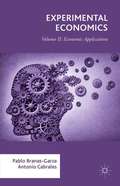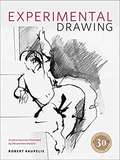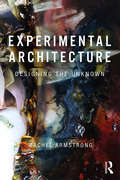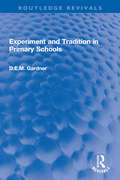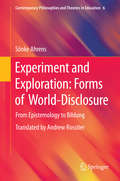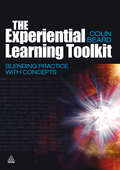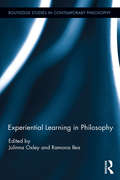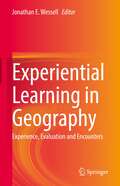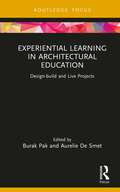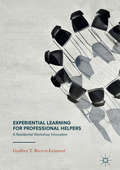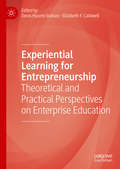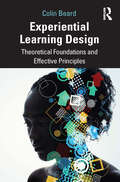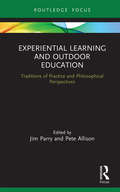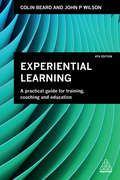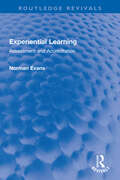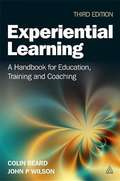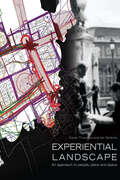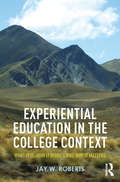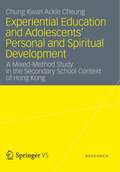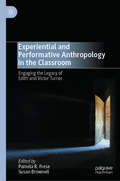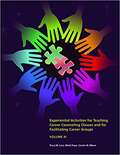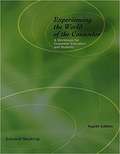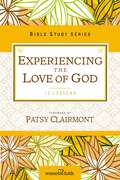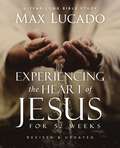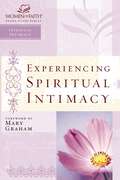- Table View
- List View
Experimental Drawing: Creative Exercises Illustrated By Old And New Masters
by Robert KaupelisAs with most art forms, it's best to comprehend traditional drawing techniques before you break the rules. But once you've mastered the basics, you may find that you gravitate to more abstract ways of rendering everything from still lifes to figures. However, this book is not only about avant-garde style; it is experimental in that it forces the artist out of his or her comfort zone, whatever that might be. In this book, renowned New York University professor, Robert Kaupelis, shares the tutorials that he used with his students, offering illustrations of drawings and paintings from old masters to contemporary artists (and even some outstanding works from his students) to explain techniques. Covering everything from creating form through contour drawings to drawing with new technology, Experimental Drawing helps you zero in on concepts and form ideas that may take your work to a new and more intriguing level. Some of the innovative exercises you'll find here include: • Drawing models while blindfolded • Engaging in group drawing sessions popularized during the Dada era • Utilizing different drawing materials like glass, plastic, feathers, string, sponges, metal dust, and more • Reducing a post's brushstroke from six to one • Using cross-contour lines for a more abstract still life • Integrating a grid system on a carefully rendered scene to create an illusion of distorted space and movement • And much more... This classic volume's inventive and stimulating projects will help serious artists develop their own vision and their own way to draw. Includes more than 200 spectacular drawings by old and modern masters from Michelangelo to Jasper Johns.
Experimental Architecture: Designing the Unknown
by Rachel ArmstrongIn this ground-breaking book, the first to provide an overview of the theory and practice of experimental architecture, Rachel Armstrong explores how interdisciplinary, design-led research practices are beginning to redefine the possibilities of architecture as a profession. Drawing on experts from disciplines as varied as information technology, mathematics, poetry, graphic design, scenography, bacteriology, marine applied science and robotics, Professor Armstrong delineates original, cutting-edge architectural experiments through essays, quotes, poetry, equations and stories. Written by an acknowledged pioneer of architectural experiment, this visionary book is ideal for students and researchers wishing to engage in experimental, practice-based architectural and artistic research. It introduces radical new ideas about architecture and provides ideas and inspiration which students and researchers can apply in their own work and proposals, while practitioners can draw on it to transform their creative assumptions and develop thereby a distinctive "edge" to stand out in a highly competitive profession.
Experiment and Tradition in Primary Schools (Routledge Revivals)
by D.E.M. GardnerFirst published in 1966, Experiment and Tradition in Primary Schools was written to provide an account of the author’s pioneering study of the attainment of young children in schools where the curriculum was shaped by their spontaneous interests. The book describes the findings of Gardner’s work and assesses them in detail. It will have lasting relevance for those with an interest in the history of education and the development of education in infant and junior schools.
Experiment and Exploration: Forms of World-Disclosure
by Sönke AhrensThis book deals with contemporary epistemological questions, connecting Educational Philosophy with the field of Science- and Technology Studies. It can be understood as a draft of a general theory of world-disclosure, which is in its core a distinction between two forms of world-disclosure: experiment and exploration. These two forms have never been clearly distinguished before. The focus lies on the experimental form of world-disclosure, which is described in detail and in contrast to the explorational form along the line of twenty-one characteristics, which are mainly derived from empirical studies of experimental work in the field of natural sciences. It can also be understood as an attempt to integrate elements of the Anglo-Saxon Philosophy of Science with elements of the German tradition of Educational Philosophy. This is also reflected in the style of writing. In accordance to the content-level of the book, the argument for experimental forms of world-disclosure is written in an essayistic, readable style, which can be understood as an experimental form of writing. This book is a translation of the doctoral thesis 'Experiment und Exploration. Bildung als experimentelle Form der Welterschließung' (summa cum laude). The thesis was published in German in 2010 by Transcript (Bielefeld) in the series called 'Theorie Bilden', edited by Prof. Dr. Hannelore Faulstich-Wieland, Prof. Dr. Hans-Christoph Koller, Prof. Dr. Karl-Josef Pazzini and Prof. Dr. Michael Wimmer.
The Experiential Learning Toolkit
by Colin BeardThe Experiential Learning Toolkit presents a diverse range of practical exercises, which are based on the theory of experiential learning. Experiential learning is concerned with learning through direct experience, which aims to create more effective, engaging and embedded learning. Each activity presented includes a description of the underlying principles, practical information on delivering the exercise as well as tips and further reading. The exercises cover a range of training needs including; effective customer service, telephone skills, applying strategic thinking, and developing creativity. Trainers will find this an invaluable resource, with fresh approaches which engage and inspire learners.
Experiential Learning in Philosophy: Philosophy Without Walls (Routledge Studies in Contemporary Philosophy)
by Julinna Oxley Ramona IleaIn this volume, Julinna Oxley and Ramona Ilea bring together essays that examine and defend the use of experiential learning activities to teach philosophical terms, concepts, arguments, and practices. Experiential learning emphasizes the importance of student engagement outside the traditional classroom structure. Service learning, studying abroad, engaging in large-scale collaborative projects such as creating blogs, websites and videos, and practically applying knowledge in a reflective, creative and rigorous way are all forms of experiential learning. Taken together, the contributions to Experiential Learning in Philosophy argue that teaching philosophy is about doing philosophy with others. The book is divided into two sections: essays that engage in the philosophical debate about defining and implementing experiential learning, and essays that describe how to integrate experiential learning into the teaching of philosophy. Experiential Learning in Philosophy provides a timely reflection on best practices for teaching philosophical ideals and theories, an examination of the evolution of the discipline of philosophy and its adoption (or reclamation) of active modes of learning, and an anticipation of the ways in which pedagogical practices will continue to evolve in the 21st century.
Experiential Learning in Geography: Experience, Evaluation and Encounters
by Jonathan E. WessellThis book provides insight into the importance and impacts that experiential learning has in geographic education by examining the experience, the methods of evaluation, and the encounters that students have shared about their experiences. It allows the reader to gain insight into what it really takes to prepare and lead students in such experiences both domestically and internationally. The book can be used as a guide to planning, but also demonstrates the use of experiential learning theory throughout these experiences and especially the importance of reflection by the students on what they are experiencing. The book is beneficial to students and faculty alike that are studying geography education.
Experiential Learning in Architectural Education: Design-build and Live Projects (Routledge Focus on Design Pedagogy)
by Aurelie De Smet Burak PakThis book is designed to be of interest to many different audiences due to its cross-sectoral and transdisciplinary content. It will appeal to those within architectural higher education as well as to spatial practitioners, students, civic and governmental organizations engaged in socio-spatial projects. The book is (1) an academic source of critical and practice-driven knowledge on experiential architectural design learning, (2) provides methods for other ways of learning in the form of design-build and live projects and (3) offers design inspiration for community-engaged spatial practices relevant to both educators and practising architects and designers.
Experiential Learning for Professional Helpers
by Godfrey T. Barrett-LennardThis book describes in considerable depth and detail a series of workshops in therapeutic counselling in the early 1960s, for people working in social or mental health care who wished to expand their skillset and capabilities. The book is unique in its comprehensive retrospective viewpoint of the effect of these workshops: rather than merely adopting an objective stance by describing the processes, structures and impacts of intensive group work, the book invites us into the initial conversations in the room, and then follows the group members back into their lives, allowing us to see the longer term impact of participation some ten years later. Finally, Barrett-Lennard reflects on the group, and on the history of the profession more generally, and makes a compelling argument that the foundations of the group and the participants' motivation for fully participating in such an intensive process are as powerful today as they were in the 1960s. The blend of qualitative and long-term data is genuinely unique, and the work provides a valuable insight into the history of therapeutic counselling and training. It will be of great interest to students and scholars of psychology and psychotherapy, as well as practising therapists and trainees who want to do meaningful work with their client groups.
Experiential Learning for Entrepreneurship: Theoretical and Practical Perspectives on Enterprise Education
by Denis Hyams-Ssekasi Elizabeth F. CaldwellThis topical new book provides an illuminating overview of enterprise education, and poses the question as to whether current establishments have adequate systems in place to prepare students for the world of work. Addressing the increasing need for graduates with practical skills and expertise in the labour market, this collection of insightful chapters analyses the opportunities that are available for aspiring entrepreneurs to develop enterprise skills and experience key aspects of starting and running a business, whilst in a supported environment such as an educational program or incubator scheme. With comprehensive discussion of higher education initiatives and empirical examples of experiential learning in the workplace, this book is an important and timely read for those researching business enterprise, entrepreneurship and higher education more generally.
Experiential Learning Design: Theoretical Foundations and Effective Principles
by Colin BeardExperiential Learning Design comprehensively demonstrates the key theories and applications for the design of experiential approaches to learning and training. Learning is gradually moving away from management and delivery of content, and toward experiences that encourage learners to engage and take greater responsibility for their own progress. This book’s empirically sound, multi-disciplinary approach balances technical-rational and artistic-intuitive design elements to accommodate the complex, fluctuating capacities of human learning. In-depth chapters cover design principles, social and environmental factors in learning, the importance of senses and emotions, and links between body and brain. This bold, unique perspective shift will enrich the work of learning scientists, instructional designers, educational technologists, and beyond.
Experiential Learning and Outdoor Education: Traditions of practice and philosophical perspectives
by Jim Parry Pete AllisonThis book adds to the theoretical development of the emerging fields of experiential learning and outdoor education by examining the central concept, 'experience', and interrogating a central claim of experiential learning: whether, and if so how, a short-term singular experience can transform a participant’s life as a whole and in a permanent way. While such a possibility has been corroborated by the personal testimonies of participants, and the activities of instructors over many years, the book argues that we must go beyond this kind of ‘evidence’. In comparing Anglophone and continental approaches and drawing on the work of Dewey, Dilthey and Merleau-Ponty in the philosophy of experience, Experiential Learning and Outdoor Education presents the first detailed review of the concept of ‘experience’ in European philosophy, as applied to outdoor experiential learning. A vital insight into the field, this is important reading for students and researchers working in the philosophy of sport, and pedagogical theory, especially in areas relating to the outdoors, but also to experiential education more generally.
Experiential Learning: A Practical Guide for Training, Coaching and Education
by Colin Beard John P. WilsonIn a fast-paced and innovative world, traditional training methods can no longer be relied on to improve performance, engagement or promote behavioural change. Experience-based learning is more affordable, appealing and effective than ever before. Experiential Learning combines in-depth theory with international case studies from companies including Interface, Shell and the UK National Health Service (NHS) and numerous practical tools to consider when developing and delivering learning experiences in either for-profit or not-for-profit organizations. It presents a simple model, the Learning Combination Lock, which enables trainers, coaches, facilitators and educators to select the best strategies for their circumstances to maximize comprehension, knowledge retention and application. Essential reading for anyone designing and delivering learning experiences, it covers experiential learning activities, experience and intelligence, coaching and facilitation, best practice and ethics, learning environments (both indoor and outdoor) and working with the senses and emotions to help promote behavioural change.In addition to featuring new international case studies, this fully revised 4th edition of Experiential Learning considers how to develop positive habits for learning, covers the mechanisms that help people to learn and the reviewing and reflection process. It also explores the topics of gamification, 3D learning and virtual reality. Online supporting resources include audio files that introduce sensory intelligence.
Experiential Learning: Assessment and Accreditation (Routledge Revivals)
by Norman EvansFirst published in 1992, Experiential Learning was written to explore in detail the ways in which the assessment and accreditation of prior and current experiential learning (APEL) was being practised in higher education, further education, community and voluntary provision, training organisations and employment, in provision for the unemployed, youth training schemes, and for updating and retraining. The book argues that individuals can be encouraged and motivated to learn if they are enabled to develop a due sense of their own capacity to learn. It looks at the background of APEL in Britain, and explores its progression into a day-to-day concern for policy-makers and providers of formal courses and training and development programmes in many sectors. It also considers how APEL can be used alongside other economic and social developments to improve the organisation and the provision of opportunities for learning at the post-secondary stage. Experiential Learning will appeal to those with an interest in the history and theory of the assessment and accreditation of experiential learning.
Experiential Learning
by John P. Wilson Colin BeardExperiential Learning enables educators, trainers, coaches and facilitators to unleash some of the more potent ingredients of learning through experience. It presents a simple model: the Learning Combination Lock, which illustrates the wide range of factors that can be altered to enhance the learning experience. The theory is brought to life with hundreds of examples from around the world and covers issues such as: experience and intelligence; facilitation, good practice and ethics; learning environments; experiential learning activities; and working with the senses and emotions. Experiential Learning offers the skills that can be successfully applied to a variety of settings including management education, corporate training, team-building, youth-development work, counselling and therapy, schools and higher education and special needs training. This fully updated third edition includes guidance for coaches, cutting edge new material on sensory intelligence and updated models, tools and case studies throughout.
Experiential Landscape: An Approach to People, Place and Space
by Kevin Thwaites Ian SimkinsExperiential Landscape offers new ways of looking at the relationship between people and the outdoor open spaces they use in their everyday lives. The book takes a holistic view of the relationship between humans and their environment, integrating experiential and spatial dimensions of the outdoors, and exploring the theory and application of environmental design disciplines, most notably landscape architecture and urban design. The book explores specific settings in which an experiential approach has been applied, setting out a vocabulary and methods of application, and offers new readings of experiential characteristics in site analysis and design. Offering readers a range of accessible mapping tools and details of what participative approaches mean in practice, this is a new, innovative and practical methodology. The book provides an invaluable resource for students, academics and practitioners and anyone seeking reflective but practical guidance on how to approach outdoor place-making or the analysis and design of everyday outdoor places.
Experiential Education in the College Context: What it is, How it Works, and Why it Matters
by Jay W. RobertsExperiential Education in the College Context provides college and university faculty with pedagogical approaches that engage students and support high-impact learning. Organized around four essential categories—active learning, integrated learning, project-based learning, and community-based learning—this resource offers examples from across disciplines to illustrate principles and best practices for designing and implementing experiential curriculum in the college and university setting. Framed by theory, this book provides practical guidance on a range of experiential teaching and learning approaches, including internships, civic engagement, project-based research, service learning, game-based learning, and inquiry learning. At a time when rising tuition, consumer-driven models, and e-learning have challenged the idea of traditional liberal education, this book provides a compelling discussion of the purposes of higher education and the role experiential education plays in sustaining and broadening notions of democratic citizenship. .
Experiential Education and Adolescents’ Personal and Spiritual Development
by Chung Kwan CheungAdventure-based programs have become prevailing in the schools in Hong Kong. Due to the little empirical examination to the frequent use of experiential education, Chung Kwan Ackie Cheung uses mixed methods to establish its first phenomenal picture, addressing the scale of the use of experiential education and the impact of it on adolescents' development with regard to the globalizing phenomenon of Hong Kong. The findings show that experiential education, esp. adventure-based program, has been widely-spread and there is positive impact in the specified aspects self-concept, self-efficacy, learning climate and spiritual dimension of its adolescent learners.
Experiential and Performative Anthropology in the Classroom: Engaging the Legacy of Edith and Victor Turner
by Pamela R. Frese Susan BrownellThe contributors gathered here revitalize “ethnographic performance”—the performed recreation of ethnographic subject matter pioneered by Victor and Edith Turner and Richard Schechner—as a progressive pedagogy for the 21st century. They draw on their experiences in utilizing performances in a classroom setting to facilitate learning about the diversity of culture and ways of being in the world. The editors, themselves both students of Turner at the University of Virginia, and Richard Schechner share recollections of the Turners’ vision and set forth a humanistic pedagogical agenda for the future. A detailed appendix provides an implementation plan for ethnographic performances in the classroom.
Experiential Activities for Teaching Career Counseling Classes and for Facilitating Career Groups
by Tracy M. Lara Mark Pope Carole W. MinorThe experiential activities in this book are an invaluable tool in the counseling field. It is a comprehensive and didactic approach to career counseling for the counselor educator. Each chapter is well organized in clearly stating purpose, learning objectives, application of theory, target population, setting, materials needed and instructions. The content identifies key areas in career counseling consisting of theoretical orientations in counselor education development, assessment tools, pragmatic exercises and technological resources. The self-knowledge exercises help the counselor educator in resolving one's ambivalence in making sound career choices.
Experiencing the World of the Counselor: A Workbook for Counselor Educators and Students
by Edward NeukrugFilled with experiential exercises; vignettes on ethical, professional, and legal issues; self-assessment techniques; and other self-awareness activities, the workbook offers you an opportunity to examine your own life as you weave through the chapters.
Experiencing the Love of God (Women of Faith Study Guide Series)
by Women Of Faith ClairmontWe see love everywhere. It binds husbands and wives, parents and children, brothers and sisters, and close friends. But all the love we experience in this world pales by comparison to the love God has shown to us. This was a love so profound that He "gave His only begotten Son, that whoever believes in Him should not perish" (John 3:16). In Experiencing the Love of God, you will look at key passages in Scripture that talk about the divine love that God has for you. You will see how the Bible is really a love story, for God--your Hero--was so determined to be with you that He went to incredible lengths to save you. One day, He will return for you and take you to the home He has prepared! God's love is truly unparalleled, and all He asks is that you receive it! The Women of Faith® Bible Studies provide intriguing insights into topics that are relevant to women's lives today. Each guide includes twelve weeks of study, down-to-earth illustrations, and reflections to help you move the truth from your head to your heart. A leader's guide for use with small groups is also included.
Experiencing the Heart of Jesus for 52 Weeks Revised and Updated: A Year-Long Bible Study
by Max LucadoEncounter a Deeper Experience of the Person and Character of Jesus—All Year LongAlthough Jesus is familiar, and we know details of his life, could we consider him a companion or dear friend? Do his mannerisms and habits rub off on us because we spend so much time with him? Experiencing the Heart of Jesus for 52 Weeks is about walking with Jesus so closely that we become like him, that we imitate him.Based on Experiencing the Heart of Jesus and Experiencing the Words of Jesus, two bestselling books by Max Lucado, this unique Bible study helps you build a bond and a deep relationship with our Savior. You will step into Jesus's presence over the course of a year and experience the grace, forgiveness, power, love, and prayer of Jesus.This study includes:Explorations of 11 characteristics of Jesus.Prayers and memory verses to help you draw closer to Jesus throughout the week."The Heart of the Matter" sections that provide the key takeaways of each unit.Questions for personal or group study."The Heart of Jesus" sections intended to lead to deeper reflection.This 52-week study on the person of Jesus is designed so that you can start it at any point in the year. It will help you experience him in fresh and deeper ways, drawing you into the company of your Lord. This study encourages you to interact with God. All you need to do is call on him, spend time with him. And you will be changed into the image of Christ.
Experiencing Spiritual Intimacy: Women of Faith Study Guide Series (Women of Faith Study Guide Series)
by Christa KindeWomen of Faith, renowned for their unique combination of personality and truth, offer fresh new messages in their fourth series of popular topical study guides. Titles include:Receiving God's GoodnessExperiencing Spiritual IntimacyContagious JoyUnderstanding PurposeEach study guide, teeming with insights and quotes from the conference speakers provides twelve weeks of Bible study, a leader's guide for small groups, and a special take-home reminder for each week's lesson.
